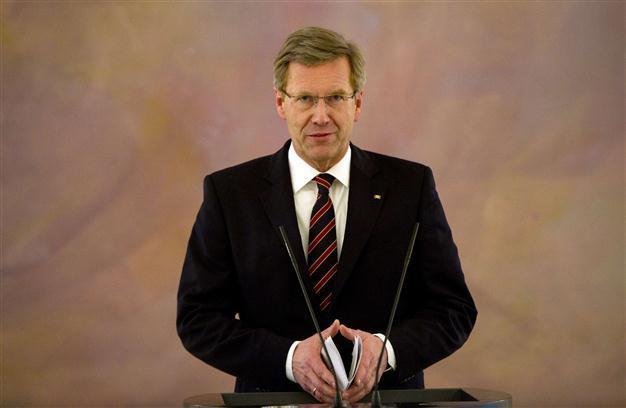Merkel seeks consensus on new president
BERLIN-The Associated Press

A photo taken on December 22, 2011 shows German President Christian Wulff giving a statement at Bellevue Palace in Berlin. German AFP Photo
Chancellor Angela Merkel says she will seek an agreement with Germany's main opposition parties on a new head of state after President Christian Wulff quit in a scandal over favors he allegedly received.
Merkel, who proposed Wulff for the presidency in 2010, on Friday expressed "deep regret" at his resignation
German President Christian Wulff resigned earlier today in a scandal over favors he allegedly received before becoming head of state, creating a major domestic distraction for Chancellor Angela Merkel as she grapples with the eurozone debt crisis.
Wulff announced his resignation today after the slow-burning affair escalated dramatically with a request by prosecutors for Parliament to lift his immunity from prosecution. He said Germany needs "a president who is supported by the confidence not just of a majority of citizens, but a wide majority."
"The developments of recent days and months have shown that this confidence, and therefore my ability to act, have been lastingly impaired," a somber Wulff said in a brief statement to reporters at the president's Bellevue palace, with his wife, Bettina, at his side.
Wulff is stepping down after less than two years in the job. He was Merkel's candidate for the presidency in 2010; before that, he was a deputy leader of her conservative party and the governor of Lower Saxony state.

Chancellor Angela Merkel. REUTERS Photo
A special parliamentary assembly made up of lower-house lawmakers and representatives of
Germany's 16 states will have to elect a successor within 30 days. Merkel's center-right coalition, which is prone to infighting, has only a wafer-thin majority in that assembly meaning she might want to seek a consensus candidate with the opposition.
The primary role of Germany's president is to serve as a moral authority, and Wulff's popularity and authority already had been eroded before prosecutors in Hannover, Lower Saxony's capital, made their move on Thursday evening.
They asked for Parliament to lift Wulff's immunity ”an unprecedented move against a German president. They said there is "initial suspicion" that Wulff improperly accepted benefits from a German film producer friend ”one element of a steady drip of allegations that has besieged the president over the past two months.
The slow-burning affair kicked off in mid-December, when it emerged that Wulff had received a large private loan from a wealthy businessman friend's wife in his previous job as state governor.
That was followed in January by intense criticism over a furious call he made to the editor of Germany's biggest-selling newspaper before it reported on the loan. Neither of those things, however, resulted in an investigation of Wulff.
But prosecutors are now looking into whether Wulff improperly accepted or granted benefits in his relationship with David Groenewold, a German film producer, and requested that Wulff's immunity from prosecution be lifted so they can pursue an investigation. Those benefits allegedly included paying for a luxury hotel stay in 2007.
The prosecutors said Groenewold is also under suspicion.
Wulff said in his resignation statement that he was convinced he would be fully cleared of any wrongdoing.
"I have always behaved legally correctly in the offices I held," he said. "I have made mistakes, but I was always honest." Wulff is the second Merkel nominee for the presidency in succession to quit early.
He replaced Horst Koehler in mid-2010 after Koehler unexpectedly resigned a year into his second term, citing criticism over comments he made about the German military.
















